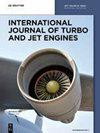基于耦合CFD方法的飞机后机身红外仿真
IF 0.9
4区 工程技术
Q4 ENGINEERING, AEROSPACE
引用次数: 0
摘要
摘要飞机推进系统作为一种内部热源,对后机身的热状态有明显的影响,从而产生红外信号。本文建立了一种耦合流热模拟方法来计算真实飞机排气系统的内外流场。考虑到多种传热模式和流固热相互作用,利用现有的实验数据对该方法进行了验证。然后提供了不同的喷嘴布局,以分析包括燃烧气体和固体壁在内的内部热部件对外部机身温度变化的影响。由于辐射通量显著加热机身外蒙皮,特别是在冷对流通道中,因此对热辐射进行了单独的研究和分析。仿真结果表明,中间防护装置的出现有效地抑制了机身外温度的升高,从而抑制了红外信号的产生。相比之下,配备中间防护罩的排气系统在3–5μm波段和8–12μm波段的机身外红外特征分别减少了69%和40%。本文章由计算机程序翻译,如有差异,请以英文原文为准。
Infrared simulation of aircraft rear fuselage based on a coupled CFD method
Abstract As an inner heat source, the propulsion system of aircraft obviously influences the rear fuselage thermal status and thus produced infrared signature. In this paper, a coupled flow-heat simulation method is established to calculate the inner and outer flow fields of a realistic aircraft exhaust system. Considering multi heat transfer modes and fluid-solid thermal interactions, the method is examined by available experimental data. Different nozzle layouts are then provided to analyse the influence of inner hot parts including combustion gas and solid walls on the outer fuselage temperature changes. Thermal radiation is individually researched and analysed since radiation flux heats the outer fuselage skin significantly, especially in the cold convection channel. The simulation results indicate that the appearance of intermediate shield device effectively suppresses the outer fuselage temperature-rise and therefore resulting infrared signatures. In comparison, the exhaust system equipped with intermediate shield could decrease outer fuselage infrared signatures by 69 and 40% for 3–5 μm band and 8–12 μm band, respectively.
求助全文
通过发布文献求助,成功后即可免费获取论文全文。
去求助
来源期刊

International Journal of Turbo & Jet-Engines
工程技术-工程:宇航
CiteScore
1.90
自引率
11.10%
发文量
36
审稿时长
6 months
期刊介绍:
The Main aim and scope of this Journal is to help improve each separate components R&D and superimpose separated results to get integrated systems by striving to reach the overall advanced design and benefits by integrating: (a) Physics, Aero, and Stealth Thermodynamics in simulations by flying unmanned or manned prototypes supported by integrated Computer Simulations based on: (b) Component R&D of: (i) Turbo and Jet-Engines, (ii) Airframe, (iii) Helmet-Aiming-Systems and Ammunition based on: (c) Anticipated New Programs Missions based on (d) IMPROVED RELIABILITY, DURABILITY, ECONOMICS, TACTICS, STRATEGIES and EDUCATION in both the civil and military domains of Turbo and Jet Engines.
The International Journal of Turbo & Jet Engines is devoted to cutting edge research in theory and design of propagation of jet aircraft. It serves as an international publication organ for new ideas, insights and results from industry and academic research on thermodynamics, combustion, behavior of related materials at high temperatures, turbine and engine design, thrust vectoring and flight control as well as energy and environmental issues.
 求助内容:
求助内容: 应助结果提醒方式:
应助结果提醒方式:


